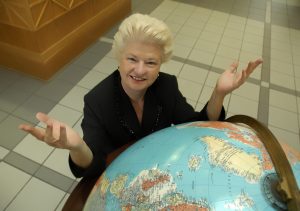
Tuscaloosa, Ala. – “Travel is fatal to prejudice,” a quote attributed to Mark Twain, is prominently posted atop the door of the offices of Capstone International Center, a division of Academic Affairs at The University of Alabama. The office’s décor is an eclectic mix of photographs and art from all over the world, much of it mementos from students who have studied abroad.
“Overseas study is for every student,” said Dr. Jane Stanfield, assistant vice president for International Education and Global Affairs. “We placed over 300 students abroad this summer. Seventy percent of these students have never been out of the country. These numbers represent almost double the numbers of students who participated in the past year.”
Over the past academic year, some 500 UA students studied abroad in 25 countries. Students apply for various reasons, including increasing language fluency, obtaining field experience or gaining world perspective, while earning academic credit.
The tuition students pay for an exchange program, one of the overseas study options, is the same as students on campus pay. Depending upon spending habits, the only difference for some may be the price of an airline ticket, officials say. Many participants draw support from financial aid, including scholarships, from UA, the federal government or their local community, Stanfield said.
“It’s all about opportunity,” said Angela Channell, director of overseas study and assistant director of Capstone International Educational Programs. “Study abroad sets a student apart from the beginning. They are seeing results in the job market – students are getting the jobs they want and employers see that our students are willing to step outside the box and handle responsibility. There is particular demand for bilingual medical, judicial and educational specialists.”
International education encourages better relations among peoples of different cultures and encourages cross-cultural communication, according to the National Association of International Educators.
It also advances learning and scholarship, builds respect among different peoples, and encourages constructive leadership in a global community, according to the association.
There are four different programs which enable UA students, both undergraduate and graduate, to study abroad.
- Exchange – literally exchanges a UA student with another student from a “sister” institution. The tuition is the same as at UA, and scholarships and financial aid is often available.
- Summer Programs – the largest program in which UA students take advantage. A group of UA students are accompanied by UA professors and/or international professors. This may be a more comfortable environment for the first time overseas study student.
- Independent Study – takes place generally for one or two semesters but not necessarily with a sister institution. This program can be highly individualized.
- Internships – are arranged with business. UA currently has 35 students in London working in positions such as an assistant on a televised cooking show, banks, the film industry and even DreamWorks SKG.
“We work closely with students and try to carefully match their needs; it is a very individualized service,” said Channell. “Some students need to go to an English speaking country. The main characteristics a student needs are flexibility, adaptability and the ability to be open-minded.”
Students aren’t totally on their own – they may travel and study with a group or have contacts with students who have traveled to the location before. Once the application process is completed, students go through a “pre-departure orientation” where topics such as safety, observing local customs, appropriate clothing, currency exchange and anti-Americanism are discussed.
“When students return from study abroad they have often had life changing experiences,” said Channell. “Some students have solidified their career choice or made a career change. Often their level of self esteem is higher and their level of sophistication rises.”
“Study abroad opens your eyes to what a wealthy country we live in. Students can learn that there isn’t a right way to do something; there are just different ways to accomplish a task,” said Channell. “Travel gets students thinking on a global scale instead of a U.S. scale. In today’s international economy, this is important.”
Rashmee Sharif, who grew up in Tuscaloosa and participated in overseas study in Spain and Italy, graduated from UA in May 2004 with a double major in Spanish and International Business.
“My experience helped my resume stand out,” said Sharif, who now works with Saks, Inc. – Parisian Division as a children’s merchandise planner in Birmingham. “I got several interviews before I graduated. My resume presented my skills, but I was able to share my experiences with interviewers, who asked me about my studies abroad, and was able to make a connection.”
Sharif said starting a new job was like travel to another country. “Even though my business isn’t international, there is a lot of adjusting to time schedules and learning how to get along with new personalities,” she said. “My experience helped me with corporate culture – it is like a little country in that there are unspoken nuances that are important to learn in order to fit in well.”
UA ranks third among Southeastern Conference schools, after Florida and Georgia which have much larger university systems, in number of students who study abroad. UA’s program ranks first in Alabama.
For more information, visit www.ua.edu/academic/international/programs or call 205/348-5256.
Contact
Rebecca M. Booker, UA Media Relations, 205/348-3782, rbooker@ur.ua.edu
Source
Dr. Jane Stanfield, 205/348-5256Rashmee Sharif, Rashmee_Sharif@parisian.com, 205/940-4854